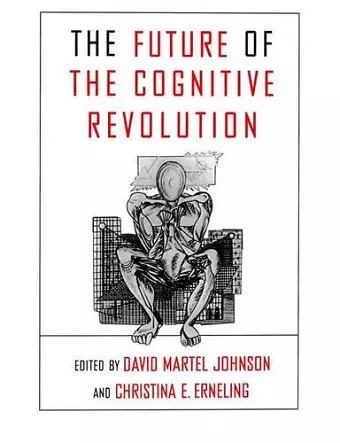The Future of the Cognitive Revolution
Johnson editor Erneling editor
Format:Paperback
Publisher:Oxford University Press Inc
Published:12th Jun '97
Currently unavailable, and unfortunately no date known when it will be back

The model of the mind developed during the twentieth century's so-called "cognitive revolution" - that the mind is analogous to computer software - has recently lost its once virtually unquestioned pre-eminence. Thus we are now faced with the question of whether it it possible to repair this model, or whether we need to reconceive it in fundamental terms and replace it with something different. In this book, 28 leading scholars from various areas of cognitive science present their latest judgments on the future course for this intellectual movement.
"The 25 chapters and related introductions in The Future of the Cognitive Revolution provide one of the finest compilations of current issues and perspectives within cognitive science. . . . [It] is written in clear and accessible language intended for a wide audience. The editors, Johnson and Erneling, provide masterful introductions to book sections and a general Introduction and Afterword that help the reader to have an overview and navigate through the book. The book could be used in an upper level undergraduate course or a graduate seminar on cognition, or subsets of chapters could be easily incorporated into graduate seminars in related disciplines. I highly recommend this book for new entrants into cognitive science as well as for seasoned researchers. This book should not be ignored."--Contemporary Psychology "[T]he use of any formal language automatizes and standardizes human thinking. From that point of view, the computer is not a model or a partner for the human mind. It is only an invention that . . . supports human mental skills. If we assume that the chapters presented in parts four and five of The Future of the Cognitive Revolution are something that can influence the mainstream of cognitive science, then we can say that cognitive revolution has a future. This future is the realization that culture together with its psychophysical products . . . constitute the environment of individual minds, that we cannot separate human thought from human action in a particular environment: 'All action involves some amount of awareness, as well as vice versa' (270). Over and above all that, I may say that The Future of the Cognitive Revolution is a consistent collection of more than thirty very good papers written by outstanding authors."--Journal of the History of the Behavioral Sciences "Instructive and fun. A valuable supplement."--Choice "The 25 chapters and related introductions in The Future of the Cognitive Revolution provide one of the finest compilations of current issues and perspectives within cognitive science. . . . [It] is written in clear and accessible language intended for a wide audience. The editors, Johnson and Erneling, provide masterful introductions to book sections and a general Introduction and Afterword that help the reader to have an overview and navigate through the book. The book could be used in an upper level undergraduate course or a graduate seminar on cognition, or subsets of chapters could be easily incorporated into graduate seminars in related disciplines. I highly recommend this book for new entrants into cognitive science as well as for seasoned researchers. This book should not be ignored."--Contemporary Psychology "[T]he use of any formal language automatizes and standardizes human thinking. From that point of view, the computer is not a model or a partner for the human mind. It is only an invention that . . . supports human mental skills. If we assume that the chapters presented in parts four and five of The Future of the Cognitive Revolution are something that can influence the mainstream of cognitive science, then we can say that cognitive revolution has a future. This future is the realization that culture together with its psychophysical products . . . constitute the environment of individual minds, that we cannot separate human thought from human action in a particular environment: 'All action involves some amount of awareness, as well as vice versa' (270). Over and above all that, I may say that The Future of the Cognitive Revolution is a consistent collection of more than thirty very good papers written by outstanding authors."--Journal of the History of the Behavioral Sciences "Instructive and fun. A valuable supplement."--Choice
ISBN: 9780195103342
Dimensions: 232mm x 159mm x 26mm
Weight: 567g
416 pages